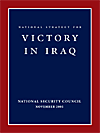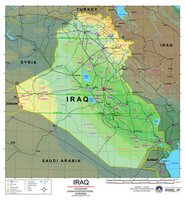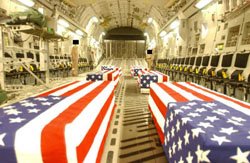 The White House released it's 38 page National Strategy for Victory in Iraq in advance of the President's speech at Annapolis.
The White House released it's 38 page National Strategy for Victory in Iraq in advance of the President's speech at Annapolis.The plan appears to put the best face on the current situation in Iraq. To force the way the war has evolved to appear as part of a strategy the administration had all along.

Overall, it appears to be a plan designed to take the current situation in Iraq and say that the administration is achieving its goals -- rather than an actual guideline for victory.
There is no specific milestone for declaring victory. Only vague guidelines for determining success along what the plan calls "tracks." The Strategy is to pursue a victory along three broad tracks: Political, Security, and Economic. The tracks are pretty broad and based on generalities.
The plan lays out short, medium & longterm definitions of victory. The "medium" term definition of victory seems to be based on the current conditions in Iraq -- allowing the administration to declare victory almost anytime they want

"An Iraq that is in the lead defeating terrorists and insurgents and providing its own security, with a constitutional, elected government in place, providing an inspiring example to reformers in the region, and well on its way to achieving its economic potential."
But the long-term definition may be decades away:
An Iraq that has defeated the terrorists and neutralized the insurgency.The plan does not lay out any timetable, but suggest that troops may be coming home in the next year:
• An Iraq that is peaceful, united, stable, democratic, and secure, where Iraqis have the institutions and resources they need to govern themselves justly and provide security for their country.
• An Iraq that is a partner in the global war on terror and the fight against the proliferation of weapons of mass destruction, integrated into the international community, an engine for regional economic growth, and proving the fruits of democratic governance to the region.
There are references throughout the plan suggesting that this is the strategy the Bush administration has pursued all along -- though no explanation as to why it took the administration nearly three years to unveil it to the American people. (The White House)But lack of a timetable does not mean our posture in Iraq (both military and civilian) will remain static over time. As conditions change, our posture will change.
We expect, but cannot guarantee, that our force posture will change over the next year, as the political process advances and Iraqi security forces grow and gain experience.
While our military presence may become less visible, it will remain lethal and decisive, able to confront the enemy wherever it may organize.
Our mission in Iraq is to win the war. Our troops will return home when that mission is complete.
(JavaScript Error)

No comments:
Post a Comment